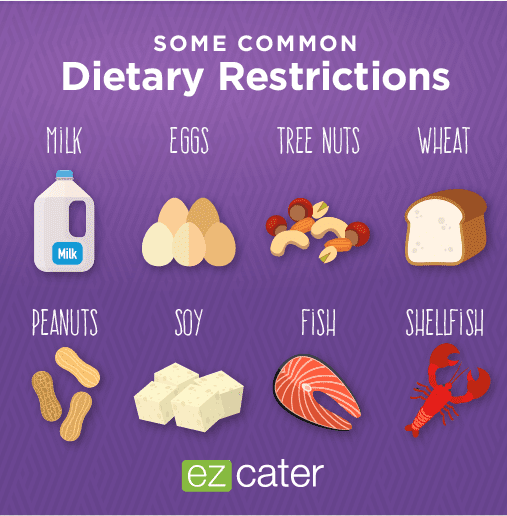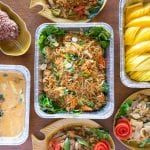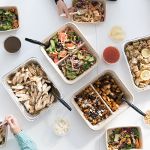The Most Common Special Dietary Requirements: Simplified
- Kristi Hines
- •
- 4 Min Read
- •

According to the FDA, the eight foods that cause 90 percent of allergic reactions are milk, eggs, fish, shellfish, tree nuts, peanuts, wheat (gluten), and soybeans. So the odds are, if you’re the one make catering choices for sales meetings, team meetings, and all-day kick-offs, you’ve run into these before. It’s your job to make sure that everyone has a great meal. But how can you keep track of everyone’s specific allergies, needs, and special dietary requirements? You want to order the right foods, but there’s got to be an easier way. Here are some of the most common special dietary requirements along with what they mean and foods that are safe to order so you can be in the clear for your next event.
What to Avoid and What to Order
These quick guidelines should help you understand what to order and what to avoid when attendees to your upcoming catered meeting mention each of these 10 allergies, intolerances, or special dietary requirements.
1) Milk/Lactose Allergy or Intolerance
What to Avoid: Stay away from any foods that have made contact with or include any form of milk (evaporated, powdered, buttermilk, etc.), cheese, butter, sour cream, custard, pudding, or other milk-based product.
What to Order: Vegan dishes are great if you’ve got a milk or lactose allergy because they don’t contain any animal-based ingredients. Try roasted veggies, a tempeh bowl, parmesan-free pesto pasta, and spring minestrone.
2) Egg Allergy or Intolerance
What to Avoid: Avoid ingredients that made contact with or include eggs in any form (dried, powdered, solids, white, yolk, etc.), including condiments like mayonnaise.
What to Order: Order vegan for this special dietary requirement, too. Mediterranean baked sweet potatoes, coconut curry, and vegan Philly cheesesteak are all great options.
3) Shellfish Allergy or Intolerance
What to Avoid: Foods that have made contact with or include fish are off limits. Examples include Caesar salad dressing, pizzas with anchovies, and Worcestershire sauce or shellfish like shrimp, crab, crawfish, prawns, krill, and lobster.
What to Order: Anything with veggies or non-shellfish meats should be fine. Chicken pot pie, pork stickers, and mini-burgers all work.
Enter you delivery address and explore caterers near you:
4) Peanut / Tree Nut Allergy or Intolerance
What to Avoid: Foods that have made contact with or include peanuts or tree nuts like almonds, beechnuts, black walnuts, butternuts, cashews, chestnuts, and other nuts listed by FARE (Food Allergy Research & Education) should be avoided.
What to Order: Loaded tacos, chicken, artichoke soup, and turkey sandwich rolls are all delightfully nut-free.

5) Wheat (Gluten) Allergy or Intolerance
What to Avoid: Avoid foods that have made contact with or include wheat or gluten. This includes many pastas, breads, crackers, baked goods, cereals, breakfast foods, flour tortillas, beer, and other items listed by the Celiac Disease Foundation.
What to Order: Anything labeled as gluten-free should be fine, but always ask to be sure. Gluten-free pizzas, grilled chicken, marinated shrimp, and slow-cooked barbecue all fit the bill.

6) Soybean Allergy or Intolerance
What to Avoid: Stay away from foods that have made contact with or include any form of soybeans including edamame, miso, tofu, tempeh, and other foods listed by FARE.
What to Order: Go with real meat dishes, like chicken empanadas, or fully-vegetarian dishes, like beet risotto and broccoli salads.
7) Vegetarian Diet
What to Avoid: Vegetarians do not eat any meat products.
What to Order: Try caprese salads, eggplant lasagna, portobello mushroom burgers, and veggie appetizer platters.
8) Vegan Diet
What to Avoid: Vegans do not eat meat products, but also avoid foods with meat, dairy, eggs, fish, honey, gelatin, or anything that is not plant-based.
What to Order: Look for vegan-labeled dishes like butternut squash linguine, sweet potato veggie burgers, and chopped kale salads.

9) Kosher Diet
What to Avoid: Keeping kosher is a religious observance that means you avoid foods with pork, some poultry, rabbit, some seafood, cheeseburgers, most ice cream, some fruits, and some yogurts.
What to Order: Anything marked kosher is fine, but to make sure that any dish is made in a kosher-friendly kitchen be sure to ask. Dishes like chicken kabob sandwiches, tuna salad, and meat or cheese lasagna usually qualify.
10) Paleo Diet
What to Avoid: The paleo diet avoids processed foods and foods with dairy, cereal grains, grain-like seeds, legumes (beans and peas), peanuts, starchy vegetables, salty foods, fatty cuts of meat, sugar, and fruit juices.
What to Order: Look for dishes without processed foods like hunter’s stew, shepherd’s pie, or beef and vegetable kabobs.
Want to learn more about how to treat food sensitivities in the workplace?








